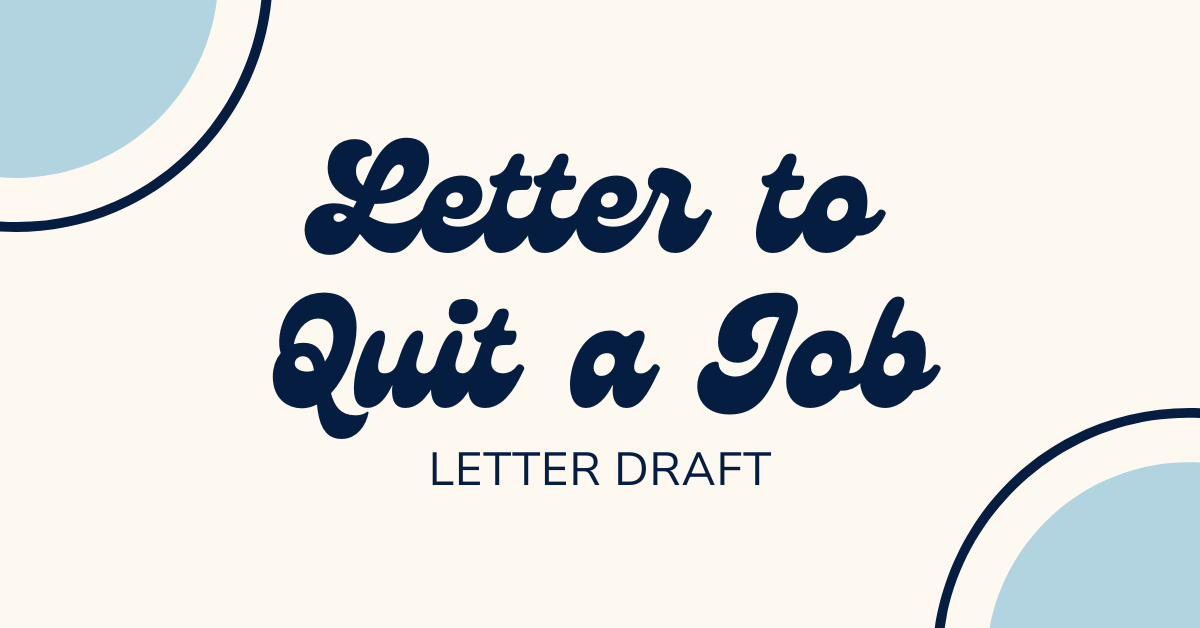Ending a chapter in your career? Enter the realm of the “letter to quit a job” – a concise communication designed to formally notify your employer of your decision to resign. Its purpose is straightforward: to articulate your intention to leave the current position and provide necessary details about the departure.
In this article, we’re not just about words; we’re about solutions. We’ll be sharing practical templates and examples of the famed “letter to quit a job.” No need to grapple with the right language or structure. We’ve got your back – making the process of writing these letters as effortless as the decision to move on.
Navigate the nuances of resigning with grace. Our templates offer a spectrum of styles, from formal to friendly, ensuring you find the perfect fit for your situation. Let’s transform your resignation letter from a daunting task into a seamless part of your career transition.

Sample Letter to Quit a Job
[Your Name]
[Your Address]
[City, State, ZIP Code]
[Email Address]
[Phone Number]
[Date]
[Recipient’s Name]
[Company Name]
[Company Address]
[City, State, ZIP Code]
Dear [Recipient’s Name],
I hope this letter finds you well. After careful consideration, I am writing to inform you of my decision to resign from my position at [Company Name]. This decision was not made lightly, but after thoughtful reflection, I believe it is in the best interest of my professional growth.
My last day of work will be [last working day, typically two weeks from the date of the letter]. I am committed to ensuring a smooth transition during this period. I want to express my gratitude for the opportunities for professional and personal development that you and the company have provided.
I appreciate your understanding and support. Thank you for the valuable experiences and opportunities for growth.
Sincerely,
[Your Name]
How to Write Letter to Quit a Job
1. Art of Articulation in Resignation Letters
Composing a letter to quit a job involves the delicate art of articulation. Learn how to express your decision with clarity, ensuring your reasons for resigning are communicated effectively.
2. The Anatomy of a Persuasive Farewell
Explore the essential components that make up a persuasive resignation letter. From addressing your supervisor to conveying gratitude, each element plays a crucial role in shaping a convincing farewell message.
3. Navigating the Tone: Striking the Right Chord
Maintaining the appropriate tone is paramount. Delve into the nuances of striking a balance between professionalism and expressing genuine appreciation. Crafting a letter that resonates emotionally while remaining formal is the key to a successful farewell.
4. Elements of a Graceful Exit
Discover the elements that contribute to a graceful exit. From providing ample notice to offering assistance during the transition, these aspects ensure your departure is marked by professionalism and respect.
5. The Power of Personalization
Explore how personalizing your resignation letter can make a lasting impression. Acknowledge specific experiences and express gratitude for the opportunities, creating a letter that goes beyond a mere formality.
6. Addressing Challenges: Handling Counter Offers
Learn how to navigate potential counteroffers gracefully. This section guides you on responding to counteroffers professionally and making decisions that align with your career goals.
7. Post-Resignation Etiquette: Leaving a Positive Legacy
Discover the importance of post-resignation etiquette. From maintaining positive relationships to leaving a lasting positive legacy, this section ensures that your departure sets the stage for future professional endeavors.
FAQs about Letter to Quit a Job
Navigating the process of writing a letter to quit a job can be intricate. Let’s address some of the most frequently asked questions about this essential aspect of professional communication.
1. Why is it important to write a letter when resigning from a job?
In my opinion, a resignation letter formalizes your decision to leave, maintaining professionalism. It serves as a documented record of your departure and contributes to a positive professional image.
2. What key elements should be included in a resignation letter?
I believe a resignation letter should include your intention to resign, your last working day, expressions of gratitude, and a willingness to assist with the transition. These elements ensure clarity and professionalism in your communication.
3. How formal should a resignation letter be?
In my opinion, striking a balance between formality and sincerity is crucial. It should maintain a professional tone while expressing genuine appreciation for the opportunities provided by the company.
4. Is it necessary to state reasons for resigning in the letter?
I think it depends on the situation. While it’s not mandatory, briefly mentioning the reasons for your decision can provide context and contribute to a constructive exit.
5. How much notice should I give in my resignation letter?
In my opinion, standard practice is to provide at least two weeks’ notice. This allows for a smooth transition and demonstrates respect for your current employer and colleagues.
RELATED:
